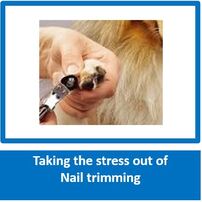
Please visit and LIKE / FOLLOW our Facebook Page and share with family, friends and on your own Facebook page, and ask them to share further – it is only by working together and sharing knowledge and education that we can improve the lives of dogs and assist owners. We do not inundate you with posts – an average of 5 per week, plus one Tip of the Week, and the odd informative post. Thank You!
Loving Your Dog Too Much
Courtesy of Thomas A. Beitz - http://www.smartdogtrainer.com

How could anyone ever love their dog too much? Our pets are the only creatures on earth that seemingly give us unconditional love. So, how could we do anything but return their love with more love and affection? I know I am about to embark on a slippery subject that is packed with controversy, but since I am not concerned with “political correctness” nor am I a graduate of Dale Carnegie's course on “How to Win Friends and Influence People” so I will stick my neck in a noose and let you be the judge.
It appears that everything in our society is becoming polarized. From the NRA to “animal rights” not to mention religion and politics. It seems we find ourselves taking one extreme view or another without any balance. There was a day when the term dysfunctional had a negative connotation to it. However, by virtue of the meaning, dysfunctional has become “normal” in our society in many ways. I am sure there is not one of us who has not experienced some kind hardship in life. It may be a child that has disappointed the family, a loss of a loved one, a relationship that has grown apart, a spouse that has betrayed us through unfaithfulness or some kind of verbal, emotional, physical or sexual abuse. It is becoming increasingly more difficult to find unconditional love in our society. So, as a result we turn to our pets for comfort and consolation.
For many people the love they receive from their pet is the only love they know as being “safe.” They know their dog will never hurt them in any of the ways I’ve described. So as a result we begin to extend privileges to our dog which under normal circumstances would be unacceptable. When you begin to love your dog too much you find yourself permitting behavior that most people would find offensive. I am convinced that one of the reasons why people are reluctant to discipline their dog for inappropriate behavior is they are afraid their dog will stop loving them. Fear of loss is an excellent motivator, but it is rooted in past failures rather than reality.
The offensive behaviors may include but are not limited to the following. You find yourself making excuses for your dog in your home for unruly behaviors such as jumping up on visitors, aggressive growling and biting, eliminating in the house, or mounting your guests (totally unacceptable for most people), running away, engaging in some sort of destructive behavior and not coming when called. These bad habits are the most common. When you find yourself excusing these behaviors and are unwilling to “correct” them you are most likely, loving your dog too much.
If you find yourself giving more affection and attention to your dog than you do your immediate family members; well then you have a problem. I have met people that will spend hours on a daily basis playing with their dog and completely ignore their spouse. There is something wrong with this picture. Another example of an inordinate affinity to your dog would be when we cut people off who don’t agree with our “dog philosophy.”
In the end analysis, if we esteem the relationship with our dog of more value than our family or human relationships, then “we are loving our dog too much.” There is no question that our dog will be the most accepting creature on earth of our quirks and idiosyncratic tendencies. However, when it leads to compromising our human relationships it may be time to seek help. I know there are 1000’s of people that live alone with their pet and their pet is the only companionship they have on a regular basis. This is not what I am talking about. I am talking about the person who creates conflict in the human relationships while ignoring conflict with his dog.
If my original comment about our society being polarized is accurate then as you read this article you or someone you know may benefit from reading it. If you are really not sure, don’t ask your dog, ask a family member.
It appears that everything in our society is becoming polarized. From the NRA to “animal rights” not to mention religion and politics. It seems we find ourselves taking one extreme view or another without any balance. There was a day when the term dysfunctional had a negative connotation to it. However, by virtue of the meaning, dysfunctional has become “normal” in our society in many ways. I am sure there is not one of us who has not experienced some kind hardship in life. It may be a child that has disappointed the family, a loss of a loved one, a relationship that has grown apart, a spouse that has betrayed us through unfaithfulness or some kind of verbal, emotional, physical or sexual abuse. It is becoming increasingly more difficult to find unconditional love in our society. So, as a result we turn to our pets for comfort and consolation.
For many people the love they receive from their pet is the only love they know as being “safe.” They know their dog will never hurt them in any of the ways I’ve described. So as a result we begin to extend privileges to our dog which under normal circumstances would be unacceptable. When you begin to love your dog too much you find yourself permitting behavior that most people would find offensive. I am convinced that one of the reasons why people are reluctant to discipline their dog for inappropriate behavior is they are afraid their dog will stop loving them. Fear of loss is an excellent motivator, but it is rooted in past failures rather than reality.
The offensive behaviors may include but are not limited to the following. You find yourself making excuses for your dog in your home for unruly behaviors such as jumping up on visitors, aggressive growling and biting, eliminating in the house, or mounting your guests (totally unacceptable for most people), running away, engaging in some sort of destructive behavior and not coming when called. These bad habits are the most common. When you find yourself excusing these behaviors and are unwilling to “correct” them you are most likely, loving your dog too much.
If you find yourself giving more affection and attention to your dog than you do your immediate family members; well then you have a problem. I have met people that will spend hours on a daily basis playing with their dog and completely ignore their spouse. There is something wrong with this picture. Another example of an inordinate affinity to your dog would be when we cut people off who don’t agree with our “dog philosophy.”
In the end analysis, if we esteem the relationship with our dog of more value than our family or human relationships, then “we are loving our dog too much.” There is no question that our dog will be the most accepting creature on earth of our quirks and idiosyncratic tendencies. However, when it leads to compromising our human relationships it may be time to seek help. I know there are 1000’s of people that live alone with their pet and their pet is the only companionship they have on a regular basis. This is not what I am talking about. I am talking about the person who creates conflict in the human relationships while ignoring conflict with his dog.
If my original comment about our society being polarized is accurate then as you read this article you or someone you know may benefit from reading it. If you are really not sure, don’t ask your dog, ask a family member.




